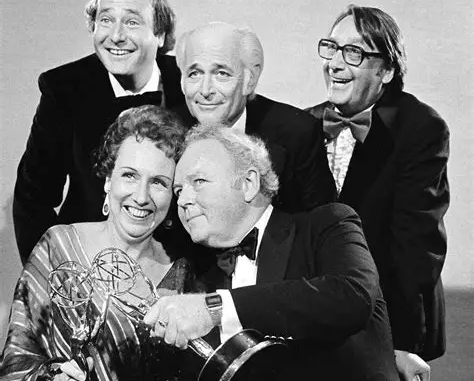
Norman Lear shocked America when his star character chose an abortion
Two months ago the Supreme Court ruled that women had a constitutional right to abortion in Roe v. Wade, Norman Lear put the issue in Americans’ living rooms when the main character in his CBS sitcom “Maude” decided to end her pregnancy.
Lear, who died Tuesday at the age of 101, and CBS faced an intense backlash over the two episodes about her abortion decision, which aired in November 1972, weeks after President Richard M. Nixon won reelection in a landslide. People flooded the network with calls in protest, and two affiliate stations refused to run the episodes. The New York Times succinctly summed up the firestorm in a December 1972 headline: “Maude Didn’t Leave ’em All Laughing.”
As today, abortion was a polarizing issue in the early ’70s, and Lear admitted recently the storyline split his own family.
“I have a glorious daughter who disagrees with every bit of that,” Lear said at his 100th birthday TV celebration last year, in a conversation with Jimmy Kimmel, Amy Poehler, Octavia Spencer and Jennifer Aniston. “This is a glorious young woman in thousands of ways, but she will disagree about that loud and clear.”
And as today, abortion policy was up to the states in the pre-Roe period. The episodes aired just two years after New York state legalized the procedure. “Maude,” a spinoff of the popular show “All in the Family,” took place in Westchester County, a suburb of New York City. Actress Bea Arthur played Maude Findlay, “an abrasive, quick-witted Roosevelt liberal,” as one TV critic called her.
In the episodes, which aired in the sitcom’s first season, Maude, 47 and already a grandmother, was shocked to learn she’s pregnant. Her adult daughter and other characters tell her she has options because abortion is now legal in the state.
“Mother, it’s ridiculous my saying this to you. We’re free. We finally have the right to decide what we can do with our own bodies,” says the daughter, Carol, played by Adrienne Barbeau.
“Mother, listen to me,” she added. “It’s a simple operation now. But when you were growing up it was illegal, and it was dangerous, and it was sinister. And you’ve never gotten over that. Now you tell me that’s not true.”
“It’s not true,” Maude replies. “And you’re right. I’ve never gotten over it.”
Lear recalls in his autobiography, “Even This I Get to Experience,” that the network’s Program Practices department initially opposed airing the episodes. “An abortion was an absolute no-no, still illegal in many states at the time,” he wrote. But the head of the department relented after Lear threatened to write in a friend of Maude’s with four kids and a fifth on the way “that she could not afford emotionally or economically, yet for whom an abortion was out of the question — and who didn ‘t understand how Maude could see it any other way.”
Still, that didn’t mean every station would run the episodes. WCIA-TV in Champaign, Ill., was one network affiliate that refused to broadcast them. “We don’t think abortion is a proper subject for treatment in a frivolous way in a comedy program,” the station manager said. In one scene, when Maude’s daughter tells her she doesn’t have to have the baby, Maude replies, “Oh, what will I do? Trade it in for a volleyball on ‘Let’s Make a Deal?’” The local chapter of the National Organization for Women filed a class-action lawsuit seeking an injunction forcing the station to air the episodes, but a judge declined to grant one.
Lear came up with the idea for the abortion storyline, and the episodes were written by Susan Harris.
Network TV had a far greater reach back then, in an era before streaming and widespread cable TV, giving “Maude’s Dilemma” an outsize impact on society. The controversy only grew when the network aired reruns of the episodes in the summer of ’73. This time, about a quarter of the affiliates chose not to air them.
In the months since the episodes had aired, the Supreme Court had issued its Roe ruling, which Lear pointed out energized the religious right.
“Zealots across the country made thousands of phone calls; seventeen thousand similarly worded letter of protest were received by CBS; hundreds in the South and Midwest pickedeted their local TV stations; and in New York City protesters lay down in front of William Paley’s car as the chairman of CBS was driving into his network’s garage,” he wrote in his autobiography.
Lear added that no corporate sponsors bought commercials for those episodes.
“The lesson here, and through the years I’ve seen it repeated over and over again,” he wrote, “is that a relatively small group of agitators, especially when convinced that God is on their side, can move corporate America to quake with fear.”